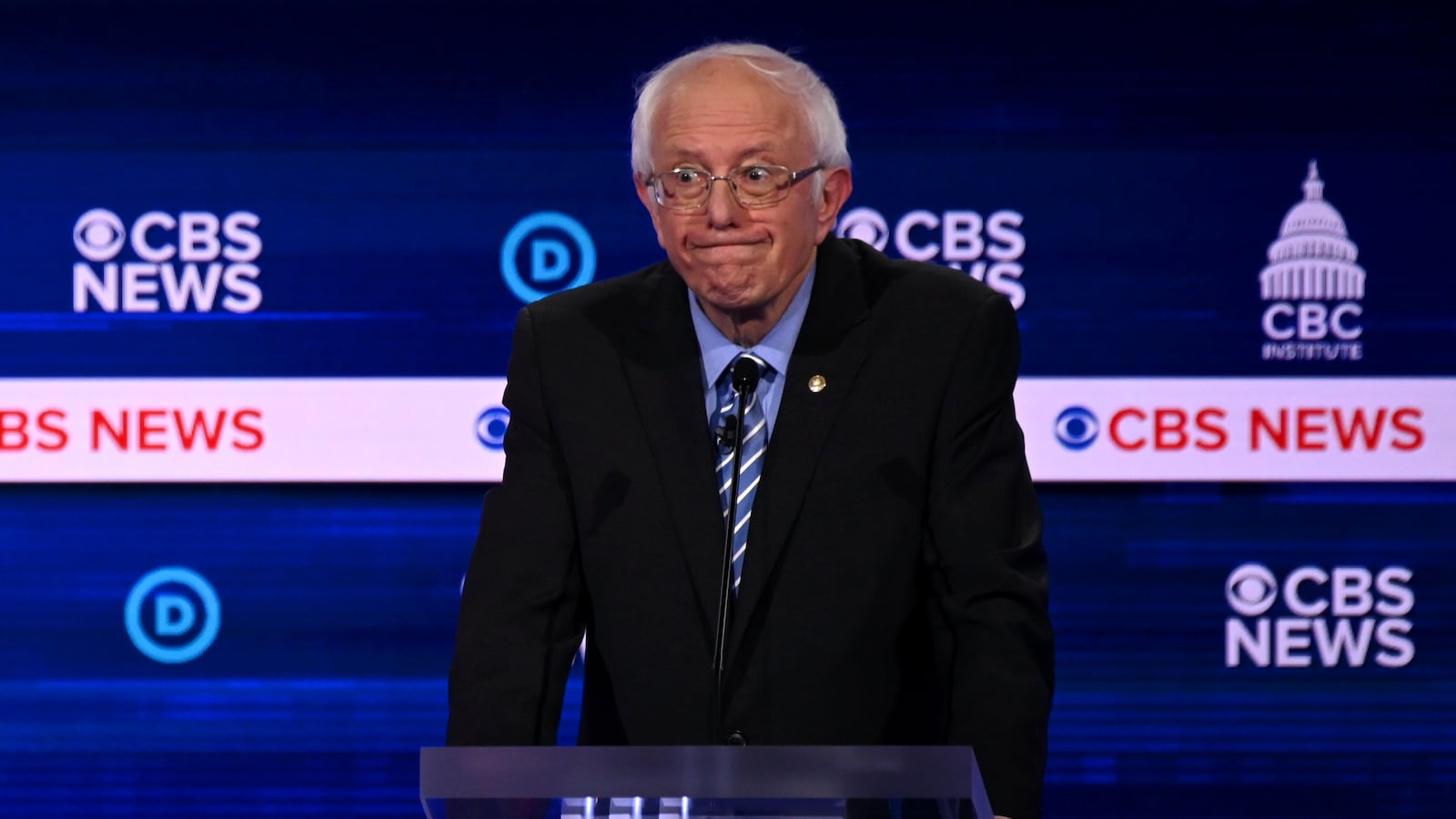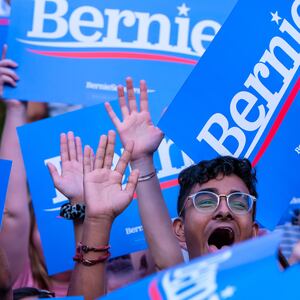For the first 10 minutes of the 10th Democratic debate, it was officially the Bernie Sanders show.
It was clear from the jump that the candidate who hadn’t faced much scrutiny in the nine prior debates was due to receive the frontrunner treatment in Charleston, the last chance for candidates to take on the Vermont senator who is surging ahead of the South Carolina primary on Saturday.
Former New York City Mayor Mike Bloomberg took the first crack, aiming to ding Sanders on recent reporting from The Washington Post that, according to intelligence officials, Russian President Vladimir Putin has been attempting to help him in order to disrupt the primary in 2020.
But he took a puzzling route to that attack. When asked if Bloomberg believes Sanders’ economic vision would be better for the country’s direction than President Donald Trump’s—a question that was originally directed at the self-avowed Democratic socialist—the billionaire former mayor quickly pivoted, seemingly out of nowhere, to Russia.
“I think Donald Trump thinks it would be better if he's president. I do not think so. Vladimir Putin thinks that Donald Trump should be president of the United States, and that's why Russia is helping you get elected,” Bloomberg said.
The line fell largely flat. But just seconds later, other candidates attempted to pile on Sanders with better success.
“Bernie and I agree on a lot of things. But I think I would make a better president than Bernie,” Sen. Elizabeth Warren (D-MA) said. After listing similarities between the two of them, Warren went on.
“I built the coalitions, and I won. Bernie and I both want to see universal health care. But Bernie's plan doesn't explain how to get there, doesn't show how we're going to get enough allies into it. And doesn't show enough about how we're going to pay for it,” she said.
And then, she got at a topic that’s dogged Sanders over the past several days: his online supporters.
“I dug in. I did the work. And then Bernie's team trashed me for it. We need a president who is going to dig in, do the hard work, and actually get it done,” she said.
The line was slightly better received than Bloomberg’s opening. But before wasting much time, it was next former South Bend Mayor Pete Buttigieg’s turn.
Turning back to the topic of Russia, the millenial ex-mayor simply said the country’s leadership wants “chaos,” before moving to mount a broad electability-based argument that Sanders progressive parties are enough to tip the election in Trump’s favor.
“I'll tell you what the Russians want. They don't have a political party. They want chaos. And chaos is what is coming our way. I mean, look, if you think the last four years has been chaotic, divisive, toxic, exhausting, imagine spending the better part of 2020 with Bernie Sanders versus Donald Trump,” Buttigieg said.
That Sanders found himself in the wringer was hardly a surprise. The senator’s second run for president had gone just about as well as he could have hoped.
Clear wins in New Hampshire and Nevada powered him to frontrunner status. He’d managed to keep the progressive wing of the party from switching allegiances to Warren. His moderate rivals struggled to maintain momentum, giving Sanders a divided field where major candidates were unwilling to drop out.
But in what may be one of his rival Democrats last attempts to slow his momentum, the 2020 field aggressively challenged Sanders during Tuesday night’s South Carolina debate as moderate fears about the democratic socialist’s electability continue.
Saturday’s South Carolina primary may be Sanders’ most important test yet. Sanders was blown out by eventual Democratic nominee Hillary Clinton there in 2016, with the Vermont Independent winning only around 26 percent of the vote to Clinton’s 73 percent. Sanders allies are more hopeful this time.
Former Vice President Joe Biden, who has struggled to prove his own electability argument, is counting on a victory in South Carolina to restore his campaign’s frontrunner mystique ahead of Super Tuesday.
The state amounts to a must win for Biden. After falling flat in Iowa and New Hampshire, a distant second place finish in Nevada has done little to rally support for the former frontrunner.
Candidates were already signaling a day before the debate how they planned to strafe Sanders. Bloomberg would take Sanders to task over his record on gun safety—zeroing in on gun friendly votes Sanders had made during his lengthy legislative career while representing Vermont.
“Unlike Bernie Sanders, I will always take the fight to the gun lobby,” Bloomberg tweeted Monday.








